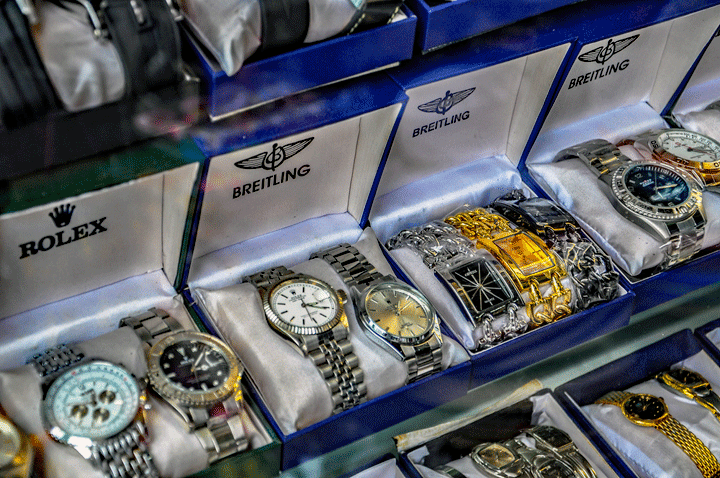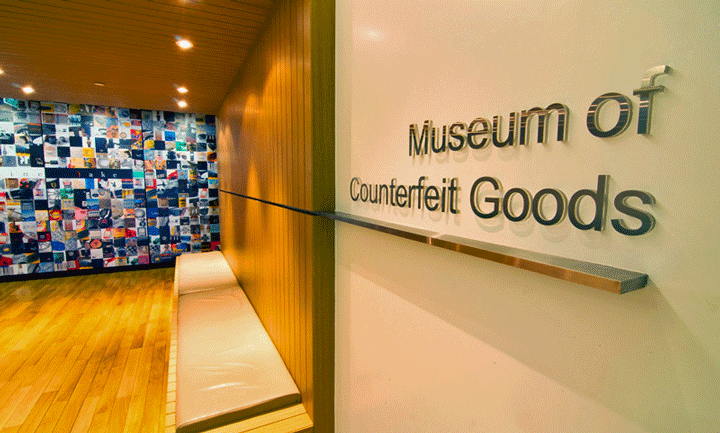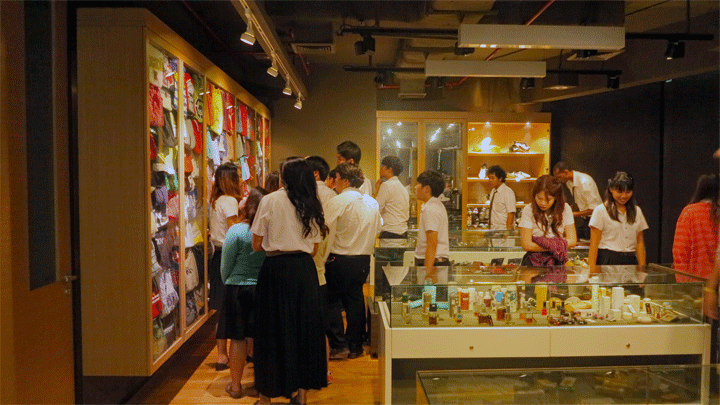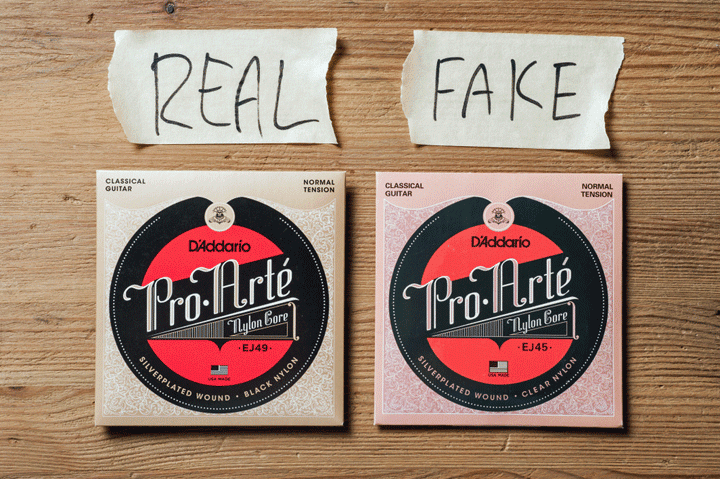Thailand's shocking world of counterfeits

Of course you already know, in Thailand many (brand) products are counterfeit and sold cheaper than the original product. It is obvious that you think in the first place of watches, (sports) clothing, women's bags and (sports) shoes. But the list of counterfeit products is much, much longer.
I'll grab: printer cartridges, staples, staplers, glue sticks, calculators, correction fluid, Scotch tape, washing powder, baby milk, bleach, toothpaste, deodorant, baking powder, noodles, chocolate, toys, mobile phones (plus parts and accessories), travel books, alcoholic beverages, cigarettes, cosmetics, perfumes, fashion accessories, spark plugs, car keys, belts, pencils, hair care products, sunglasses, medicines, alloy wheels, batteries, wallets, car care products, tool boxes, hand tools, voltmeters, welding equipment, ball bearings, car parts, car speakers, baseball caps, kitchen utensils, guitars, antifreeze and coolants, car lubricants, light bulbs, automotive compressors, plugs, light bulb starters, etc., etc.. .
Museum of counterfeit products
All of these products mentioned above can be viewed in both original and counterfeit form in a museum-style department of the large law firm Tilleke & Gibbins (T & G) on Rama III Road in Bangkok. It is only part of their "collection", because there are several thousand different counterfeit products in storage. In addition to normal legal work, the law firm specializes in trademark law, copyright and patent law. These rights can be summarized as the rights of Intellectual Property (IP) or Intellectual Property (IP). Maximilian Wechsler made an article for the magazine/website The Big Chilli Bangkok about this office and the experiences in cases where that IP was infringed. I have used some interesting parts of it for this article.

Photo: Wikipedia
Tilleke & Gibbins
About half of the activities of this law firm (also active in Vietnam, Indonesia, Myanmar, Laos and Cambodia) are cases in which they often represent foreign clients in cases related to that IP. In the first place, this is supervision to ensure that the rights are not violated, but if necessary also to take the offender(s) to court. It sometimes seems easy to prove the counterfeit, but the investigation can be very complicated in some cases. It becomes interesting (for the law firm) when they are faced with complex technological or legal issues, such as when patent disputes arise. It can sometimes happen that trademark law is not violated, but the technological process or know-how of a product is copied.
Objective of the museum
The main purpose of the museum, which was already opened in 1989, is the educational element. Many law and law enforcement students gain experience with counterfeit items here and are taught how to spot the counterfeit. Attention is therefore also paid to the legal aspects of such a forgery. The visitors are not only students, but groups of civil servants, police, public prosecutors, customs officials, etc. also regularly come to learn about counterfeit products and how to deal with them. The media and tourists also regularly find their way to this museum.
Production of counterfeit products is increasing
The nature of the violations has changed over the years. When I first came to Thailand, for example, you could buy jeans on the street and then have an emblem of the desired brand applied to them. The police can still seize counterfeit goods for sale on the street or in a shop, but there's not really much point if you don't tackle the source of the evil. Now in the Internet age that is becoming increasingly difficult. Many IP-infringing products such as movies, music and clothing are now offered online. That makes it easier for the vendors, but more difficult for IP owners and governments to track down the lawbreakers. The aforementioned article describes some memorable cases.

Photo: Wikipedia
Sportswear
A client of T & G had a license agreement with a Thai manufacturer for the manufacture of a certain brand of sportswear. The agreement was entered into for a fixed period of time and when that term expired, the manufacturer continued to make the same clothing. It went to court and the judge ruled that it was a trademark violation because it still used the same materials and processes and even manpower as the legitimate product. Production had to be stopped and the stock of 120.000 items of clothing was confiscated for destruction. These involved very large numbers, which initially cost the client a large loss of turnover.
The latter is essential, because bringing such a case to court and providing the evidence requires a lot of preparation by the lawyers. In this particular case, there were sometimes more than 20 lawyers and support staff working on it. The production volume of counterfeit goods is often very high. This applies not only to clothing, but many other products such as car parts, including products critical to public safety such as airbags and brakes.
Ink cartridges for printers
A client discovered that ink cartridges of his brand were offered at very low prices in a number of shops. It was believed that used cartridges were collected and filled with an unauthorized ink. The ink cartridges were repackaged and sold as new. The police were hesitant to take up a complaint because the packaging and ink cartridge looked genuine and original. The source was traced through T & G and a whole stock of empty cartridges and packaging material was found during a raid. It was quite a challenge to explain to the judiciary that although the packaging and the ink cartridge were genuine, only the ink was not. Therefore it was a counterfeit product.

Even guitar strings are counterfeited. Do you recognize the real one? (Nor Gal / Shutterstock.com)
What's real?
How can the average consumer determine whether, for example, such an ink cartridge is genuine or counterfeit? As a rule of thumb, the consumer may assume that a product offered for too low a price is probably a fake. With perfume, which is offered in beautiful, original-looking packaging, the consumer can never determine whether it is real or fake. The packaging should never be opened for a sniff, and even there, if the price is too good to be true, it is most likely an inferior counterfeit product.
In addition, counterfeit products such as cosmetics, perfume and other cosmetics may contain substances that may be harmful to the consumer. With counterfeit products such as brake discs, engine oil, etc., safety can be at stake.
Penalties
According to T & G, the fact that the production of counterfeit goods is still on the rise is also due to the lenient sanctions policy of the Thai judiciary. In most cases, only a fine is imposed. Imprisonment is not involved unless an offender is unable to pay bail. The primary interest of the clients is often to limit or even stop the (expected) loss of turnover and not the punishment for the offender. But yes, due to the small fines that are readily paid, repetition is very possible. People move, production is resumed and any legal proceedings can be started all over again. The law firm thus also retains its right to exist.
Source: The BiggChilli


The manufacturers of the genuine branded products would probably go bankrupt if the counterfeit trade did not exist anymore.
Who else would want to spend a lot of money on a completely unknown brand T-shirt with a label of a purple crocodile on it.
Many, many years ago I bought a number of Lacoste polos for my wife.
She was laughed at as a teacher at school because the children told her,
that the crocodile was looking the wrong way.
Many consumers cannot afford the real product and are therefore not actually potential customers. There is therefore little or no loss of turnover.
On the contrary. The fact that a branded product is copied actually means that it is a very popular product. There are even experts who claim that the counterfeit product enhances, rather than lowers, the image of the genuine product. That is why a number of manufacturers do not make such a point of copying their product, in addition to the impossibility of banning copying. That will only get worse if more and more households will have 3D printers in the future.
Who has a full package of legal software on their computer or laptop? Windows doesn't care much about it anymore because it has become the world standard thanks to the copien.
Luckily my wife is real. But the future seems to be a copy or robot woman…
It's hard for me to imagine, if you buy a Rolex for 2oo Baht that you don't know it's fake. But if fake products are also offered in big c and macro. I'm not an expert, but fake products are also offered on the markets in Ghent and Antwerp. Certainly more control.
Vdm, you were just ahead of me. In my working life, as a seafarer, I signed up a lot in Rotterdam. I then bought perfume on the market for my wife, which was simply for sale there at very low prices and also from well-known brands. I asked the saleswoman how that was possible and she said it was allowed as long as the name on the bottle was covered. Lipstick and more was just there for sale. That's called Dutch trading spirit.
Haha that's just how it is. I also bought a printer with the accompanying external ink supply, which saves a lot of money, especially if you don't print much. I have calculated that in the Netherlands, a liter of ink in the cartridges sometimes costs more than 1000 euros. I even plan to take my printer bought in the Netherlands and have it converted here. Furthermore, I prefer to buy original clothing such as Adidas or Levi, which is already half the price in the Netherlands. And is produced here sometimes nice offers in the big shops here.
I must respond to this. Buy your real clothes from adddas nike etc etc I have to mention after 10 years of going to Thailand that these are certainly not cheaper than in Belgium. On the contrary, they are certainly equally expensive. When I buy sportswear, I don't buy fake but Thai-made and I have to say that the quality is very good. This is my experience in 10 years.
I always wonder if I am obliged to know all brand names and associated prices.
When I buy a SUSU (a newly invented world brand) watch on the market in Thailand for a few hundred Baht.
Should I have known that this is a counterfeit watch from a very expensive Tibetan brand?
If I buy a T-shirt with a green caiman on it, do I need to know that it is an overpriced global brand, and do I need to know how much money the original sells for?
I have to know the law (impossible in practice), but am I not obliged to learn all world brands, including HEMA, by heart?
No, of course you don't need to know that.
But the annoying thing is, when you come back to Schiphol, customs think differently.
And then you have a problem.
Not fair, but reality!
They are more interested in real brands bought outside the EU Pieter. In 2017, counterfeiting for personal use is less of a stumbling block for them than the rules of 2 years ago. No, a Louis bag bought in eg Dubai of 5000 euros is quite a lot to pay in terms of VAT.
If people weren't crazy about some brand on the shirt, that nonsense would already be
have stopped earlier.
Consumer surveys showed that many "perfumes" had a base value of less than € 10 in raw materials.
Bottles with a certain brand name went for € 90 , and many times more in sales.
In addition to the series of counterfeits, I still miss the “diplomas” that the “graduates” can buy.
You would end up with such a “surgeon”, who just before worked in a slaughterhouse!
Indistinguishable international documents, driver's licenses, press cards, diplomas, etc. can also be added to the list, as I once saw on Kaosan Road. Nice work, but all fake.
The difference between counterfeit and genuine is sometimes clearly visible. Well-known designer brands in the department stores are real and with counterfeit T-shirts you often notice it with washing.
Once on sale at MBK Kipling, we had to go under the fence very quickly because of the police, but it really fell off the truck.
When everything was okay again inside neatly everything paid a lot of fun because of this.
It's just what you want, but you can see a clear difference.
Last week at Schiphol in a shop for customs, car brand key chains 10,00 euros counterfeit or real I don't know from the price it can be both, you don't have to travel to Asia for counterfeit, Spain Greece buys everywhere your counterfeit clothes, check out social media, plenty for sale,
Aliexpress is not allowed to sell counterfeit but sellers are getting creative just search Find brands on Aliexpress, then you can find lists where to search eg Adidas Superstar search on Superstar Shoes.
It's mopping with the tap open, also in the Netherlands react like this body that goes to markets, but every year they have different lists if a brand doesn't pay more then you can sell it.
It's all about money, I don't get it myself, I really don't care about a fake rolex on my wrist, I don't care about brands at all.
I find it worse when fake medicines are sold!
No one has ever died from fake jeans!
The clothing industry in Asia is not known as very positive. Just think of that factory disaster in Laos a few years ago. Many brands and retail chains now have a certificate stating that work is done 'neatly' in safe factories. But that's another side of the story of producing cheap stuff to make a profit. A few weeks ago on the program 'De Rekenkamer' on NPO 3, we saw what it now costs to mass-produce sunglasses. 1 sea container full of sunglasses was less than 1000 euros.
It seems to me that the 'fake' has two sides. Strong brand names that used to produce in the west went and are going to Asia to have their products produced cheaper there. Because yes, profit maximization, the shareholder must be satisfied. Meanwhile, it is assumed that it concerns exactly the same product. Employment here is gone, poor workers are squeezed out for next to nothing and manufacturers and workshops are forced to sell below cost with strangling contracts. Then flip it ten times over and sell it here with exorbitant profit margins. If the trade were really fair, it wouldn't be like that.
Furthermore, the brand names themselves are partly to blame, because they promote their products as 'something you must have', regardless of your income.
Moreover, there is nothing new under the sun. As soon as something is successful and it earns money, this happens. The follow up is sometimes/often the imitators end up making something better than the original. See Japan, which has started counterfeiting in cars, motorcycles and electronics, among other things.
There is always a pro and a con, but it is certain that the brand names have butter on their heads.
Not everything that is on the markets and is offered at a low price is fake. At the factories in China, sometimes something falls off the truck or too much is (on purpose?) produced. At a market somewhere in the Isaan I once saw women's clothing with Hema price tags on it!
These are products that are no longer sold here and are dumped on the world market at the price per kilo. Have even seen dresses from Lidl (Esmara).
It seems to me that this law firm would have a very clean job in China.
Of course it will be quite difficult to get in there, after all, counterfeiting and copying is a statesman's opportunity…
I associate counterfeiting with cheating, but who cheats and what is counterfeiting?.
Counterfeit: is it always counterfeit, of course not .. example: Nike places an order for 10 million pairs of shoes in China .. they produce 12 million pairs there, in other words 2 million pairs of Nike's end up on the (black) market somewhere and we think for those price it must be counterfeit.. nope, they are real but cheaper.
I read the "real" can live with it because it is advertising, so to speak, not Nike, and don't laugh now, but they have decided to e.g. to have the left shoe made in China and the right one in Korea for example … again “don't laugh” this is the truth.
Cheating: it's the end of the year and it's sales in all respectable shops / stores in both Belgium and the Netherlands ... and then you can buy T-shirts from very well-known brands for example quite cheaply ... it has already been considered that that “end of the year promotion” is based on a product of a much lower quality.
Conclusion: the big brands (more than) regularly cheat consumers and what is the problem that the little man somewhere in Thailand or the Philippines wants to get a piece of the pie, of course this does not apply to medicines including viagra for those who are along.
I read something about a crocodile emblem, man, man, man you can buy it separately (all brands) and sew it on a T-shirt, of course you sew yourself then ... I call that hypocritical.
I would say buy what you like, if it is a brand then so be it, but you don't necessarily have to ... if everyone in your pub or wherever is walking around with a T-shirt of, for example, something from Boss or Tommy H. and you with a T-shirt from eg Girav, then you are "the" original, aren't you... after all, you wear what you feel good in and not to parade on the catwalk.
This is my opinion.
It only becomes really dangerous when fake medicines, or medicines from very low-wage countries, are sold.
Example
I needed some pee pills, bought it taking with me the original old packaging issued in Khon Kaen………within a day I was coughing up blood and after visiting the hospital it was found that medication bought in town OR 20 years old or at generally resembled what I needed.
Of course I was not asked where I bought the medicine.
Watch out!
I don't know if it's true, but I've been told that more 'Red Label' is sold in Thailand than Johnny Walker produces worldwide.
Says enough about the alcohol intake, but also about the authenticity of that product.
I once bought a pair of Nikes at Robinson's sports department. I didn't wear them that much, so they only broke after 5 years. Since the sole came off during a bamboo boat trip. Turned out they were fake too. Then you really think to buy. Were the price of genuine anyway
A few years ago I bought a canon G3000 printer in the printer shop in the parking garage of the BIGC extra in Chiangmai. I still had to do some shopping and the boss said she would prepare the printer and I could pick it up when I had done the shopping. When I started printing I didn't like the colors and I suspected it was the ink. The printer has reservoirs and they are refillable with bottles of which an original set came in the box with the printer and I assumed the printer shop had used that when they prepared the printer. I then bought a new set of original ink and took some ink from the printer's reservoirs to compare and there was quite a difference in color and fluidity. So with the printer and the ink samples back to the shop but the boss got pissed, she said she used the ink from the box. Behind her back I asked one of the guys from the service and he turned up his nose in that Thai way with a look at the back of the boss, not denying and not confirming. I knew enough and left but the result was that the print head broke within a year and was not covered by the warranty. The canon service in Chiangmai still tried to explain the situation, but with the quality of the staff there, that was also a hopeless mission.